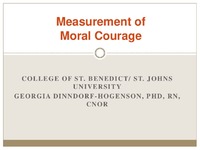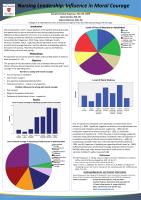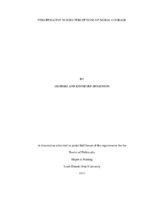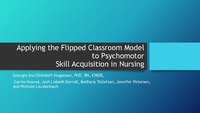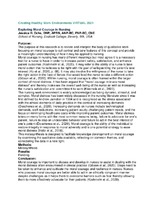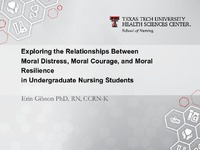| dc.contributor.author | Dinndorf-Hogenson, Georgia A. | en |
| dc.date.accessioned | 2014-11-17T13:44:34Z | |
| dc.date.available | 2014-11-17T13:44:34Z | |
| dc.date.issued | 2014-11-17 | |
| dc.identifier | INRC14D10 | |
| dc.identifier.uri | http://hdl.handle.net/10755/335113 | |
| dc.description | <p>International Nursing Research Congress, 2014 Theme: Engaging Colleagues: Improving Global Health Outcomes. Held at the Hong Kong Convention and Exhibition Centre, Wanchai, Hong Kong</p> | en |
| dc.description.abstract | <p>Session presented on Friday, July 25, 2014:</p>
<p><strong>Purpose:</strong> Threats to patient safety exist. Nurse appraisals of these threats and the likelihood to act with moral courage have not been documented. This descriptive correlational study examined moral courage response to threats to patient safety. The moral courage model was based on Lazarus and Folkman's theory of stress and coping. The Dillman, Smythe, and Christenson (2009) tailored design method was used to construct the Moral Courage Questionnaire for Nurses (MCQN) instrument. Moral courage frequency and intensity were explored.</p>
<p><strong>Methods:</strong> A randomized mail questionnaire distributed to Midwest perioperative registered nurses yielded 50% response rate (N = 154).</p>
<p><strong>Results:</strong> Multiple regression analysis results indicate moral courage in perioperative nurses is significantly influenced by Magnet status, certification, peer support, institutional culture, fear, and previous operating room experience. Perioperative nurses from Magnet hospitals were significantly more likely than nurses from non-Magnet hospitals to stop a surgical procedure performed by a physician with alcohol breath (F = 7.99, p = .005). Urban perioperative nurses were significantly more likely to stop the procedure than nurses from smaller rural hospitals (F = 4.95, p = .028). Significant positive correlations were shown between previous OR experience and the level of moral courage addressing physician substandard practice (p = .004). Significant negative correlations occurred between fear of reprisal and retaliation and (a) reporting ethical issues to administration (p = .001), (b) questioning provider when not in best interest of patient (p = .001), (c) frequency of speaking up when risks to the patient are known (p = .006), and (d) moral courage overcoming being silent about an ethical issue (p = .005). Fear of reprisal and retaliation were positively correlated with moral distress (p = .000). Sufficient performance of the MCQN Likert-type scale showed contrast of scale scores to reflect variance; Cronbach's alpha measured 0.81.</p>
<p><strong>Conclusion:</strong> Findings indicate the moral courage model performance was robust with the exception of the motivational value systems variable. Perioperative nurses reported high moral courage in situational threats to patient safety. Significant findings clustered influencing factors of fear, previous experience, peer support, and institutional culture. Furthermore, Magnet status, peer support, previous operating room experience, institution's urban location, supportive nursing management and administration promote perioperative nurses' exhibition of moral courage. Future research is indicated for supportive nursing management and policy creation promoting moral courage in situations that are threats to patient safety within the perioperative area.</p> | en |
| dc.format | Text-based Document | en |
| dc.language.iso | en | en |
| dc.subject | Patient Safety | en |
| dc.subject | Nursing Leadership | en |
| dc.subject | Moral Courage | en |
| dc.title | Measurement of moral courage | en |
| dc.title.alternative | Patient safety and nursing autonomy | en |
| dc.type | Presentation | en |
| dc.rights.holder | <p>
All rights reserved by the author(s) and/or publisher(s) listed in this item record unless relinquished in whole or part by a rights notation or a Creative Commons License present in this item record.
</p><p>
All permission requests should be directed accordingly and not to the Sigma Repository.
</p><p>
All submitting authors or publishers have affirmed that when using material in their work where they do not own copyright, they have obtained permission of the copyright holder prior to submission and the rights holder has been acknowledged as necessary.
</p> | en |
| dc.description.note | <p>Items submitted to a conference/event were evaluated/peer-reviewed at the time of abstract submission to the event. No other peer-review was provided prior to submission to the Henderson Repository.</p> | |
| dc.type.category | Full-text | en |
| dc.evidence.level | N/A | en |
| dc.research.approach | N/A | en |
| dc.contributor.department | Kappa Phi at-Large | en |
| dc.author.details | Georgia A. Dinndorf-Hogenson, PhD, RN, CNOR | en |
| dc.conference.name | 25th International Nursing Research Congress | en |
| dc.conference.host | Sigma Theta Tau International | en |
| dc.conference.location | Hong Kong | en |
| dc.date.conferenceyear | 2014 | |
| dc.description.reviewtype | Abstract Review Only: Reviewed by Event Host | en |
| dc.description.acquisition | Proxy-submission | en |
